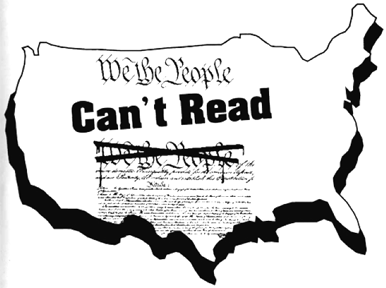Literacy in the 19th century was defined as the ability to read and write. Early American Leaders believed this was an important quality to guarantee a healthy democracy. Thomas Jefferson wrote his concerns about literacy in 1816 stating “Where the press is free, and every man able to read, all is safe.”
 America's obsession with literacy was evident in the colonies long before they became the United States. In 1642, Massachusetts passed a law to monitor children’s ability to read and understand the principles of religion and the laws of the country. Every Man Able to Read
America's obsession with literacy was evident in the colonies long before they became the United States. In 1642, Massachusetts passed a law to monitor children’s ability to read and understand the principles of religion and the laws of the country. Every Man Able to Read
In the past 239 years since the USA became a country there have been hundreds of laws created at the federal and state levels to address education and literacy. In 1980 the current Department of Education was created, their mission is: To promote student achievement and preparation for global competitiveness by fostering educational excellence and ensuring equal access. Each year millions of dollars generated from taxes are spent on public education at the state and federal levels.U.S. Department of Education

Fast forward to 2015 where the definition of literacy has changed in America today. The new term Functional Literacy is defined as the ability to apply reading, writing, math and technical skills in order to be productive in society.
The ability to read and comprehend at a 8th grade level and do general math functions at a 6th grade level are the standards often used to determine Functional Literacy. Functional Illiteracy in the United States Literacy and education continues to be a value that is addressed by many leaders in America today, however it does not often have the important priority that the first leaders of the United States gave it. Functional Illiteracy and Literacy Problems in America
Unfortunately not every adult in American can read, consequently all is not safe in our country. The illiteracy rate of adults in the United States has increased during the past thirty years.
It is estimated that currently there are 32 million adults living in America that are considered to be illiterate.
This means 14% of the adult population in the United States cannot read.
An additional 23% or 44 million American adults are not able to read above a basic proficiency level.
For American adults who can read, there are 63 million who can only read between a 6th and 8th grade comprehension.23 Statistics on Adult Illiteracy
The high percentage of adult illiteracy in our country has several on going negative effects on America's well being. Financially illiteracy is very expensive, the majority of prisoners in state and federal prisons are classified as low literactes. Many illiterate adults are unemployed or underemployed and depend on government programs to support them and their families. Proliteracy.org
With the average readability level of American adults at 7th grade comprehension. News articles, blog posts, websites and documents are frequently revised to accommodate lower reading levels. The U.S. Illiteracy Rate Hasn't Changed In 10 Years
When a large portion of the American adult population struggles with reading it creates many changes in our society. Author Chris Hedges address how illiteracy affects our society in his book from 2009 titled: Empire of Illusion: The End of Literacy and the Triumph of Spectacle. He believe that when a large portion of the population is illiterate another society is created where people live in a false world. In this video from 2012 Mr. Hedges explains how we now live in two societies; the first is literate and can cope with complexity. The second is retreating from a reality-based world into one of false certainty and magic.





No comments:
Post a Comment